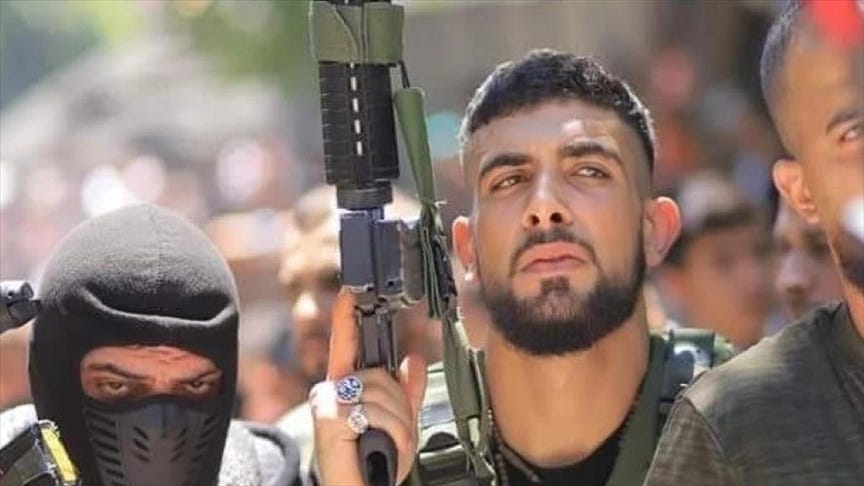“I love you so much. If I am martyred, guys, I love my mother. Take care of the homeland after I’m gone, and my final will to you, on your honor: don’t let go of the rifle — on your honor. I’m surrounded, and I am going towards my martyrdom. Pray for me.”
The last words left by Ibrahim Al-Nabulsi, as he was killed by Israeli Occupation Forces Tuesday impacted me deeply in ways I did not expect. Thousands of Palestinians have been murdered by Israel, yet this one was different. We seldom hear the last words of our martyrs. We are only used to seeing their dismembered bodies and pale faces with only our imaginations to guide us into their thoughts.
“Ibrahim was hunting them, not the other way around,” Nabulsi’s father said. “Whenever he heard about an Israeli army raid, he was the first to go out and confront them. This was his fate. We praise God.”
Nabulsi at only 18 years old struck fear in the hearts of a violent colonial machine.As one of Israel’s most wanted men in the northern West Bank city, Ibrahim had survived several attempts at his life, most notably on July 24 when he and a group of fighters were surrounded in a house in the al-Yasmina neighbourhood of Nablus’ old city. While he managed to escape alive while two other fighters Muhammad Azizi, 25, and Abdul Rahman Jamal Suleiman Sobh, 28, were murdered.
Unafraid of the dangerous consequences of his public appearance, Nabulsi attended the funeral of his comrades the next day unmasked in defiance of his murderers.
Palestinians like Nabulsi, however, are not mourned by mainstream liberal organziations or human rights groups. Although only 18, Nabulsi does not get an obituary, a condemnation by mainstream activists, or a public vigil. For the West, Palestinians like Nabulsi does not fit into the dehumanizing role of the innocent Palestinian victim. He is a militant, a commander, a terrorist- never a freedom fighter.
In his article, academic Ramzy Baroud describes the creation of the “victim intellectual”, or the victim whose message is entirely shaped by his sense of self-pity and victimhood. The creation of the victim intellectual was done due to the limited spaces available for Palestinians to speak about violent Israeli occupation and crimes, forcing some to choose whatever avenues available to gain support by Western media and audiences.
“In other words, in order for Palestinian intellectuals to be able to operate within the margins of mainstream Western society — or even within the space allocated by certain pro-Palestinian groups — they can only be allowed to narrate as purveyors of victimhood. Nothing more” Baroud writes.
In a video that appeared on social media, The Lion of Nablus tells the world that his only wish is that his people wake up.
“I just want our people to take a firm stand against the occupation. For there to not be any spies or traitors. That is my only request, I don’t want anything except this. ” he said.
To honor Ibrahim’s wish, we must not fight for Palestine simply within the margins that are socially acceptable. We cannot bat our eyes and ignore that a violent occupier cannot be silenced solely with protests and boycotts. Instead these methods should only work in tandem with our resistance fighters, individuals who give their lives to see a liberated Palestine.
Nabulsi’s mother mourned her son’s death with ululations as she addressed a crowd of supporters. “Ibrahim triumphed,” she said. “"My son, who is dearer to me than my own soul, has returned to his lord. Although they shot Ibrahim, there are hundreds like him. You are all Ibrahim’s. You are all my children” she said.
Often people want to associate the mothers of Palestinian resistance fighters as villains willing to send their child to die. Many do not understand that these “children” feel as if there is no other alternative except to fight.
Israel conducts near daily raids in the West Bank and killed over 80 Palestinians so far this year. Their latest ceasefire in Gaza shifted their attention to killing Palestinians elsewhere. There is no such thing as a ceasefire living under an apartheid regime. Based on vague declarations simply labeled “security threats,” Israel is allowed to perform extrajudicial killings and assassinate whom they please solely based on speculation. They operate outside the law with impunity. Ibrahim understood this. Thousands like Ibrahim understood this.
Their commitment to forcefully free Palestine from a violent occupation is not because they crave death or even that they do not fear death. It is instead because they crave life and are tired of being at the mercy of their colonizer.
In my conversation with a fellow Palestinian, he said that although the romanticisation of the Palestinian “hero” can be ineffective there is a certain kind of romance for resistance and martyrdom that we should latch onto.
“We should mobilize it as a remedy against the dehumanizing logic of victimhood and innocence,” he said.
We can only “take care of the homeland” as Ibrahim pleaded, when we finally take a firm stand and mourn all Palestinians- even those that dared to fight.





